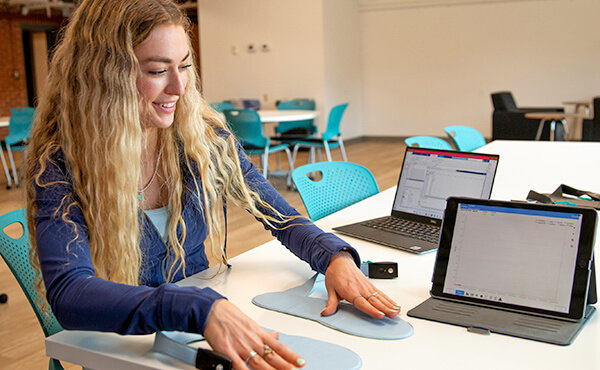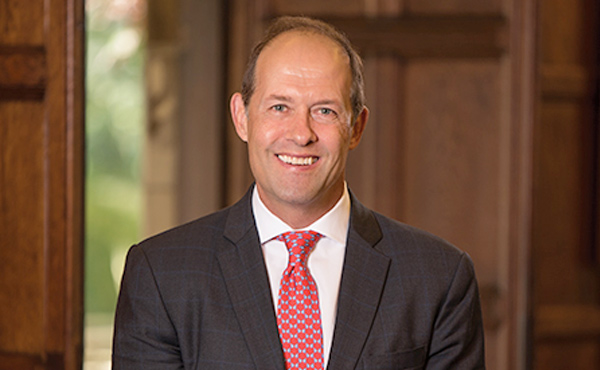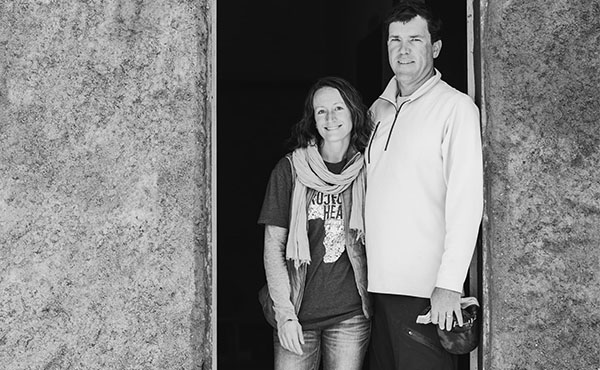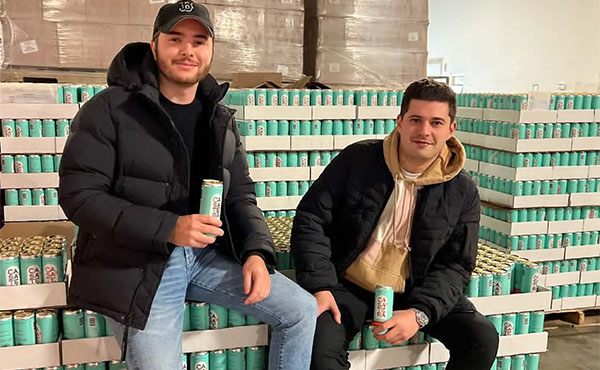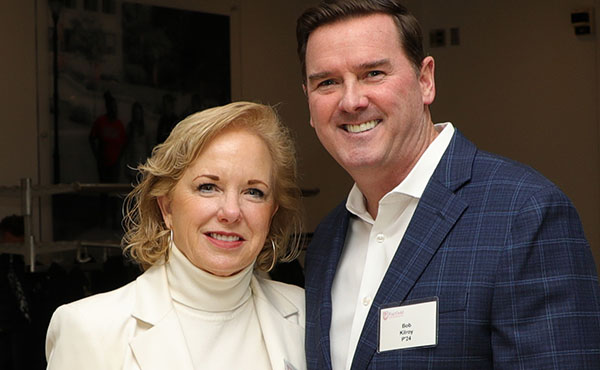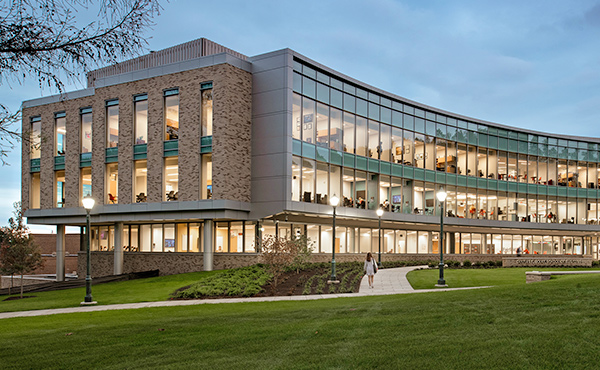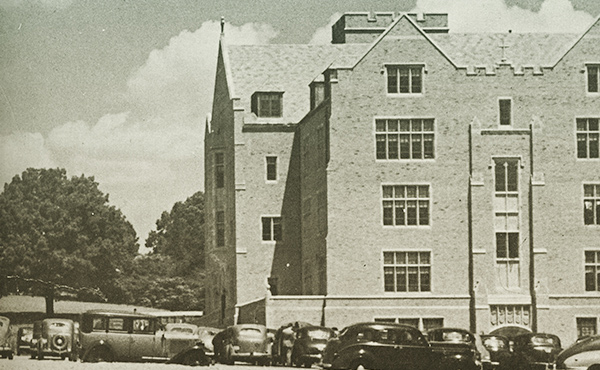The School of Engineering and Computing has a new name and vision for the future.
The long-term vision is to become the highest-quality program that we can become. That begins by hiring the best faculty, engaging them in cutting-edge research, and making sure they maintain quality relationships with students.
— Andres Leonardo Carrano, PhD, Dean
Boldly painted on the wall in the new renovated dean’s office in what is now the School of Engineering and Computing, are the words “Engineering With a Higher Purpose.” Dean Andres Leonardo Carrano, PhD, professor of mechanical engineering, and a fourth-generation engineer, explained that the change to the name of the school, announced this summer, reflects the burgeoning interest in the field of computer science on campus and in the world at large.
“If you look at the last three, four, five years, the most rapidly growing department in our school is Computer Science,” Dr. Carrano said. “And it’s not unique to us, but with the advent of artificial intelligence, data science and analytics, and cybersecurity… there has been significant interest from incoming students, as well as employers.” The School of Engineering and Computing (SEC) boasts a 14:1 student professor ratio as well as a 100 percent employment rate of students surveyed six-months after graduation.
The school has offered study options in engineering and the computer sciences for years, but one program that has shown particular strength recently has been Cybersecurity, on both the undergraduate and graduate levels.
“We try to engage our online graduate students just as we would our on-campus undergraduate students,” said Mirco Speretta, PhD, director of the SEC’s Cybersecurity program, “so we have many different activities for them to work on, including community engagement with local nonprofits.” These programs are what makes Fairfield’s grad program in Cybersecurity so unique.
For instance, for the last two years, Dr. Speretta’s graduate classes have worked on a capstone project for the Catholic Diocese of Bridgeport, assisting with their cybersecurity needs. Groups of students conducted scans, probing the networking for vulnerabilities that hackers can exploit (an outdated version of Windows, for example, or services that were not patched), and delivered a comprehensive report including all vulnerabilities that were found, along with the references and solutions.
“It’s a real work experience for them,” Dr. Speretta said. He also explained that it would be accurate to imagine cybersecurity as akin to defending efforts to penetrate the layers of an onion and to consider each layer as something that has to be built and protected. Teaching students to protect cyber activity at each entryway or level of activity, as one would “lock your house, your car,” is what he works with students to do on a practical, technical level. It’s also paramount to understand human nature. “It comes down to individual behavior; a good chunk of the problem is because [people] actually volunteer their data,” Dean Carrano said. “A big part of cybersecurity is to train and prevent that from taking place.”
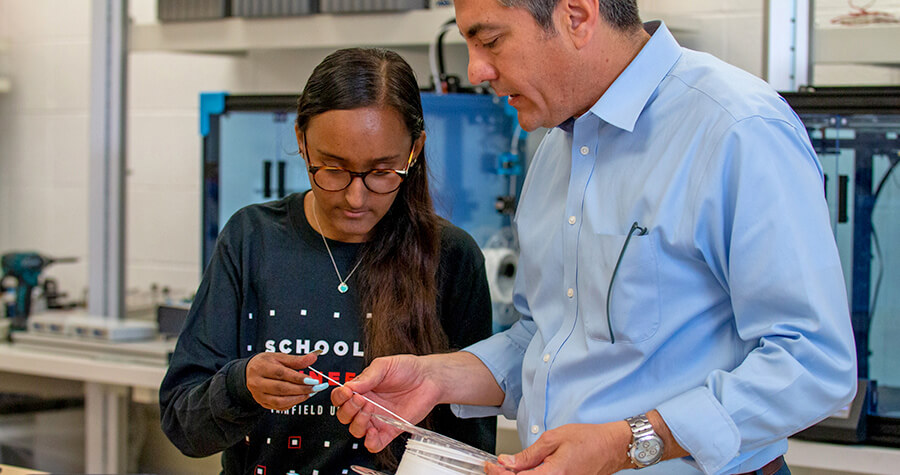
Dean Carrano works with recent engineering graduate Manjot Singh ’23.
Computer Science students are also involved in providing cybersecurity support to the University as a whole. Fairfield University Magazine was led down the hall of the Bannow Science Center into the Security Operations Center, where we first met Dr. Speretta.
This state-of-the-art lab has been designed to monitor the University’s network through a partnership between the SEC and the University’s Information Technology Services (ITS) division, which runs Fairfield’s computer systems.
“We wanted to offer our undergraduate students a more involved and meaningful cybersecurity education,” Dr. Speretta said. For this reason, the security team — led by Fairfield’s Chief Information Security Officer Henry Foss and Dr. Speretta — and the SEC explored the idea of opening industry-standard tools to students in a professional environment.
The SEC also opened an Innovation Annex space last year, and this fall will launch an Artificial Intelligence Lab.
Additionally, the engineering school has designed a distinctive Computer Science program for Fairfield Bellarmine — the University’s new academic initiative offering a two-year associate’s degree to students from the Bridgeport region.
“There are very few professions that are more impactful than engineering, that can actually have an impact on society through technology, through innovations,” Dean Carrano said. “The long-term vision is to become the highest-quality program that we can become. That begins by hiring the best faculty, engaging them in cutting-edge research, and making sure they maintain quality relationships with students.”
Learn more about the School of Engineering and Computing at fairfield.edu/engineering.
